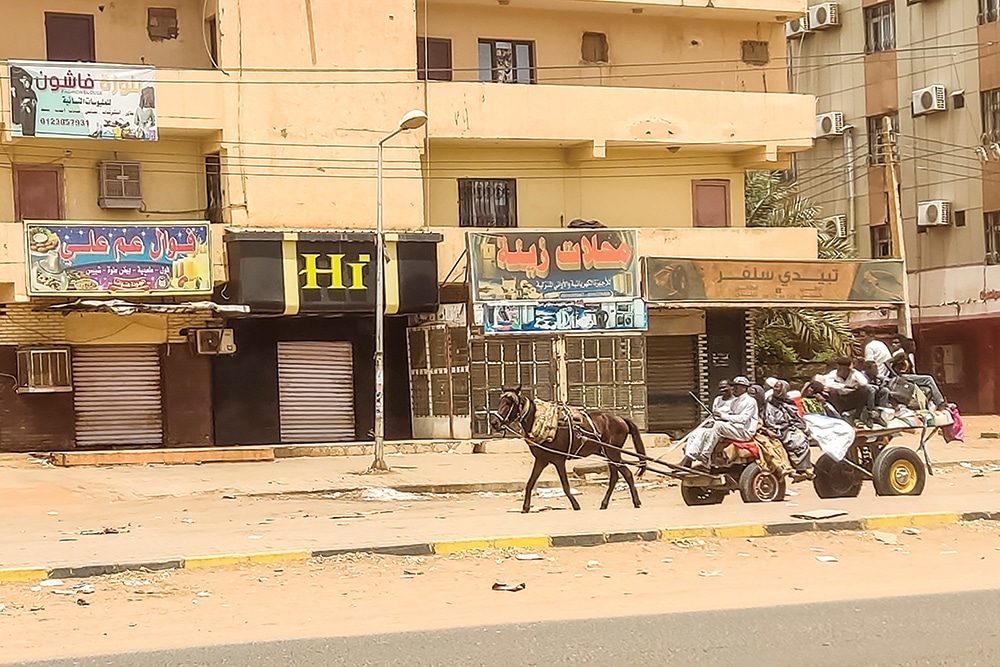CAIRO: In Sudan’s battle-hit capital, residents desperately count their last banknotes as nearly two weeks of fighting has frozen cash sources and pushed an already faltering financial system to the brink. Banks have been closed since battles broke out on April 15 between forces loyal to rival generals, and Khartoum’s five million residents, running low on food and basic supplies, are now almost out of cash as well.
“Even if you have money in the bank, it means nothing,” researcher Hamid Khalafallah told AFP. “Your money is trapped in the bank.” The fighting that has killed hundreds of people has also taken its toll on basic services such as water supply and electricity. With intermittent internet and communications, even banking apps are no longer accessible, and shuttered airports mean liquidity that had previously arrived from abroad has been cut off.
“People were not prepared for what happened,” said Khaled Al-Tijani, editor of local newspaper Elaf, referring to the escalating clashes between the forces of army chief Abdel Fattah Al-Burhan and his deputy-turned-rival Mohamed Hamdan Daglo. Tijani predicted that “in the next few weeks there will be a serious problem” as many in Sudan “were surprised by the developments and the escalation”.
At least 512 people have been killed and 4,193 wounded in the fighting between army forces loyal to Burhan and Daglo’s powerful paramilitary Rapid Support Forces (RSF), according to health ministry figures, although the real death toll is probably much higher. When the sound of heavy shelling woke Khartoum residents on April 15 on the first day of the fighting, people “had to use cash to buy food supplies as the war erupted”, Khalafallah said. “They must have consumed most of their cash.”
‘Goodwill’ forex
That liquidity is crucial, not only to survive the wartime conditions but also to escape, with transport costs skyrocketing since mid-April. “Fleeing Khartoum or the country requires a lot of money, mostly in cash, that people do not have at the moment,” Khalafallah said.
Ashraf, who has been caught for days at the border crossing to Egypt, told AFP getting his family out of Sudan meant complying with the demands of bus drivers. “I only had (US) dollars and he wanted Sudanese pounds because that’s how he buys gas,” Ashraf said.
“He accepted my dollars, but at 400 pounds to the dollar, when the official exchange rate is 600.”
Amid the soaring demand for local currency, Tijani said “the value of dollars is now subject to the goodwill of whoever agrees to exchange them”. Fluctuations in the exchange rate will probably continue, with one foreign businessman saying that “demand for the pound has exploded”.
Khalafallah noted that people on monthly wages had not yet been paid when the fighting began.
Kholood Khair, founder of the Khartoum-based Confluence Advisory think tank, said “those who work in the informal sector and earn a daily wage... haven’t been able to get any more cash”.
‘Closed until further notice’
With most workplaces in Khartoum having closed, people have been unable to earn a living. Many have “restored to bartering, in the hopes that the war will end soon”, Tijani said. Others cling to the hope that their pay will come via online payment platforms — a tenuous prospect as this requires both power and internet services.
The situation is even worse outside Khartoum in a country where only 31 percent of Sudanese have internet access, according to monitoring service Data Reportal. Even overseas remittances have no way of landing as foreign exchange transfer firm Western Union told AFP it had “closed until further notice”. Sudan’s banks have long been cut off from global networks during more than two decades of international sanctions under former dictator Omar al-Bashir, and many in the 45-million-strong population prefer to keep their cash close at hand.
But now they run the risk of money and valuables being confiscated at checkpoints, particularly for those attempting the trip out of the country on their own. “If you take your own personal car... it will be taken from you by the RSF,” Khair said. “People have had experiences of that.” — AFP










